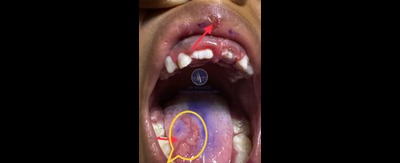
What Are Aphthous Ulcers?
Aphthous ulcers, also known as canker sores, are small, painful lesions that form on the soft tissues inside the mouth — such as the inner lips, cheeks, tongue, or gums. Unlike cold sores, they are not contagious and don’t appear on the outside of the mouth. Although generally harmless, they can cause discomfort while talking, eating, or drinking. Most aphthous ulcers heal on their own within 1 to 2 weeks.
Types of Aphthous Ulcers
Minor Aphthous Ulcers
These are small, round or oval ulcers (less than 1 cm) with a white or yellow center and a red border. They typically heal within 7–10 days without scarring.
Major Aphthous Ulcers
Larger and deeper, these ulcers may last up to 6 weeks and often leave scars after healing.
Herpetiform Ulcers
These appear in clusters of tiny sores that can merge into a larger ulcer. Despite the name, they are not caused by the herpes virus.
Common Causes and Triggers
While the exact cause isn’t always clear, aphthous ulcers may be triggered or aggravated by:
-
Mouth trauma (e.g., biting the cheek, dental work)
-
Stress or hormonal fluctuations
-
Nutrient deficiencies (iron, B12, folic acid)
-
Acidic or spicy foods (e.g., citrus fruits, tomatoes)
-
Allergies to toothpaste or mouthwash (especially those with sodium lauryl sulfate)
-
Medical conditions like celiac disease, Crohn’s disease, or Behçet’s disease
Symptoms of Aphthous Ulcers
-
A tingling or burning sensation before the sore appears
-
A round, white or yellow ulcer with a red border
-
Pain or soreness, especially during eating or speaking
-
Occasionally: fever, swollen lymph nodes, or fatigue (in severe cases)
How to Treat Aphthous Ulcers
Home Remedies
Rinse with salt water or baking soda solution
Apply ice chips to the ulcer
Avoid spicy, acidic, or crunchy foods
Over-the-Counter Treatments
Topical gels with benzocaine or lidocaine
Antiseptic mouthwashes to prevent infection
Oral painkillers like ibuprofen or acetaminophen
Prescription Treatments
Corticosteroid creams or rinses
Immune-modulating medications for recurrent or severe cases
When to See a Doctor
See a healthcare professional if:
-
Sores are large or persist beyond 2–3 weeks
-
You have frequent outbreaks
-
There is severe pain, fever, or difficulty eating
-
You suspect an underlying medical issue
How to Prevent Canker Sores
Use a soft toothbrush and gentle oral care products
Avoid known trigger foods
Manage stress with regular self-care or therapy
Eat a balanced diet rich in vitamins and minerals
Stay hydrated and maintain overall health
Final Thoughts
While aphthous ulcers can be uncomfortable, they are typically not a cause for concern. Simple home remedies and over-the-counter solutions often bring relief. If you’re experiencing persistent or severe mouth ulcers, our clinic can help you identify the cause and recommend effective treatment.
Need professional help for recurring mouth ulcers?
Book an appointment with Dr. Abdiaziz Mohamed today for expert dermatological care and personalized treatment solutions.

